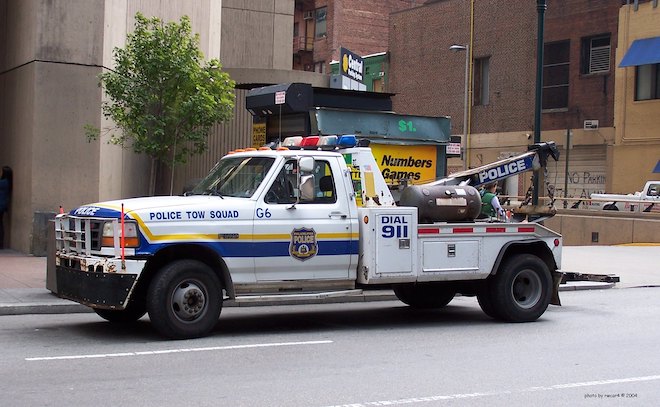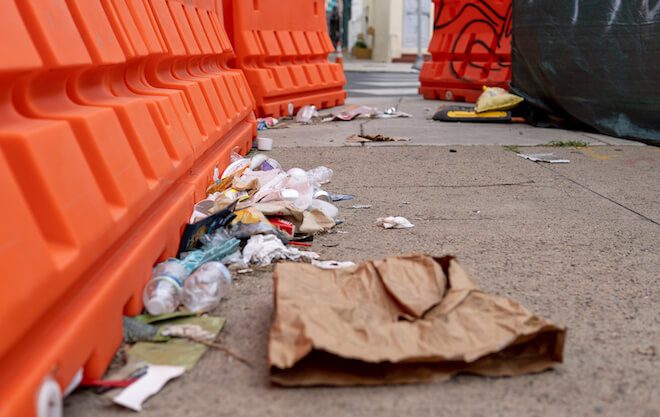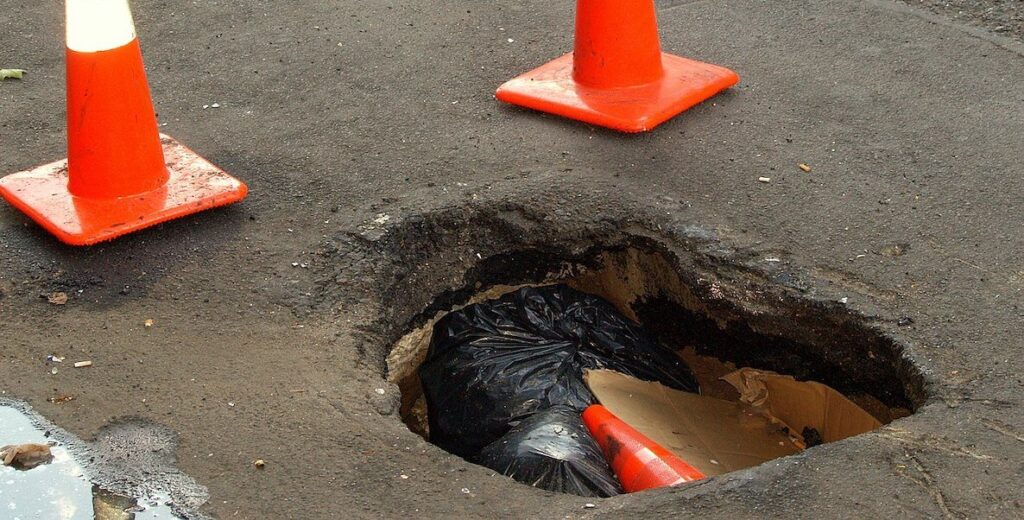In the spring of 2000, a few months after taking office, Mayor John Street donned a baseball cap and jeans, climbed into a blue flatbed tow truck and headed towards an eyesore, in a neighborhood full of eyesores, to make good on a campaign promise. His target: one of an estimated 40,000 abandoned cars he pledged to haul away within 40 days, as part of an effort to eliminate blight in neighborhoods outside of Center City.
To get there, Street mobilized an army, as The Inquirer reported a couple years ago:
Street assigned the neighborhood services unit — which had 46 officers at the time, nearly double its current roster — to work with 25 private tow companies in a blitz involving over one hundred tow trucks, front-end loaders, and car crushers. Street personally drove one of the tow trucks.
While the $1.6 million initiative fell short of its initial goal, the long-term focus on junked cars largely paid off. Street later claimed to have removed some 289,000 abandoned cars from the streets throughout his eight years in office.
It was, for the nascent Street administration, an immediate, obvious win that made an immediate and obvious difference in the lives of thousands of Philadelphians before they even fully had time to process the change in City Hall. Street’s Deputy Managing Director Ted Dallas said at the end of the 40 days — during which 33,000 cars were towed — that it was “possibly one of the most successful things we’ve done.”
In a city desperate for decisive and life-changing leadership, opportunities abound to … find your own immediate success and be a hero to your still young constituency.
Mayor Cherelle Parker, take note. In a city desperate for decisive and life-changing leadership, opportunities abound to create your own abandoned car strategy, find your own immediate success and be a hero to your still young constituency.
Here are three ideas:
Eliminate courtesy towing
Park your car in a perfectly legal spot that six days later is the site of a parade, or a construction site, or a random weather event? Good luck finding it again. What our City euphemistically calls “courtesy towing” is the act of relocating a legally parked car for whatever reason the City deems necessary. The problem is, no one has to notify you that the car is about to be moved, that it has been moved, or where it has ended up.
That raging, crying, hair-pulling neighbor you see wandering up and down the street with their key fob out may never find their car; may find it racking up tickets in a metered spot (as The Citizen’s Mystery Shopper did); may need to call 911 — an emergency number! — for help (as, again, our Mystery Shopper was told to do); may find it in a Philadelphia Parking Authority tow lot, after it’s been towed from somewhere illegal.

And in an injustice of Philly-sized proportions, there is no recourse, as The Inquirer has well-documented in this telling example:
Matthias Wagman, a 31-year-old nurse in Center City, had to pay $808 in December 2022 after his Nissan Maxima was towed from his permitted spot near 15th Street to a metered spot at 13th and South Streets, where he received seven parking tickets from the PPA.
Wagman, who has joined the class-action suit, was denied at every step of the appeals process, all the way up to Common Pleas Court, where Judge Anne Marie Coyle ordered him to pay the full amount because he had no documentation that he hadn’t parked in the metered space.
“I was shot down in probably less than a minute,” he said, adding: “Why would I park in a metered zone that’s just blocks away from my permit parking that I pay for yearly?”
This absurdity has embroiled the City in two class-action lawsuits, which have already cost taxpayers at least $30,000 — and that Mayor Kenney’s legal department continued to fight.
Other cities have systems in place that make it easy for drivers to at least track their cars if they are moved. We do not. Until then, Mayor Parker should decide in week one to eliminate all courtesy towing (or at least the majority of it, done by police or private agencies under her oversight). Every single parker in Philly will thank her.
Declare a litter state of emergency.
Is there any more visible target of Parker’s campaign promise to make Philadelphia the “safest, cleanest, greenest big city” than the scraps of trash, Big Gulp cups and pizza boxes — not to mention dumped mattresses, tires and appliances — that Philadelphians encounter everyday? There is not.
The psychic — not to mention environmental — toll of living in “Philthadelphia” is hard. If Mayor Parker could ease that burden, she would be a giant among women.
Before taking office, Parker announced a new Office of Clean and Green Initiatives, a terrific start — along with its new director, former Streets Commissioner Carlton Williams, a questionable choice given the state of our streets under Williams these last several years. What she needs now is a big, bold initiative that breathes fresh air — get it? — into her efforts to clean up the city.

Former Mayor Street focused his efforts on a few particular areas of the city, in Kensington, North and Southwest Philadelphia, with the worst blight and abandoned cars. Similarly, the Streets Department knows where the biggest illegal dump sites are, and the roads where most litter gathers. Those could be the first places to start, with Parker sending a troop of trash collectors to do a comprehensive clean that gives residents a feel for what it could be like to have litter-free streets. Maintaining those streets requires a combination of better and more government investment in trash pickup, enforcement of illegal dumpers, leadership holding us to better standards — and wholehearted participation by all of us. (Can Parker inspire an army of volunteers? Now is the time to do so.)
Can you imagine the play Parker could get from an image of her beautifully smiling countenance next to a mountain of trash that her administration cleared from city streets in the course of a week? It’s an image that would — like Street in the tow truck — be part of her legacy forever.
Fill 33,000 potholes. In a month.
On January 10, 2022, Corpus Christi, Texas, Mayor Paulette Guajardo announced what she called “Saving Our Streets,” a 30- to 45-day effort to fill all the potholes in the city’s six-month backlog of needed repairs. Guajardo sent forth a crew of city workers and private contractors, who worked seven days a week, using a water-based technology called “jet patcher” that allowed them to fill 150 potholes per crew per hour.
On March 6, 2022, Guajardo announced the results: Her team had fixed 33,700 potholes, about 95 percent of its goal.
Compare that to what happens here in Philadelphia, where according to a primer on the issue in Philadelphia magazine, the city fills between 30,000 and 70,000 potholes in a year. That is, needless to say, not enough.

Potholes are not just a nuisance. AAA estimates damage from a pothole costs $600 on average, a heavy driving tax on a city with already very high taxes. Potholes are an eyesore, a sign of neglect, unevenly distributed and another source of frustration on the part of Philadelphians who just want to get around without worrying about blowing out a tire on a crowded street.
Parker can show us she cares by taking a page out of Guajardo’s — or Street’s — book: Set a goal for fixing the blight, and do what it takes to get there.
Parker may face union pushback if, like Guajardo, she turns to private contractors to do the work. But could there be a way to negotiate her way to a solution? It could be worth it, for everyone involved. Neither patience, nor good will, is limitless, without swift action to back it up. A smoother ride for Philadelphia drivers could mean a smoother ride for Parker in her first year in office — something she may need to call on when times get tough.
Plus, imagine being a mayor remembered for making life — hard as it is — easier for many, to be known as one resident said of John Street: “He made it worth living in North Philadelphia.”
![]()
MORE IDEAS FOR MAYOR CHERELLE PARKER




